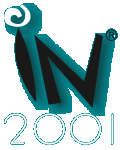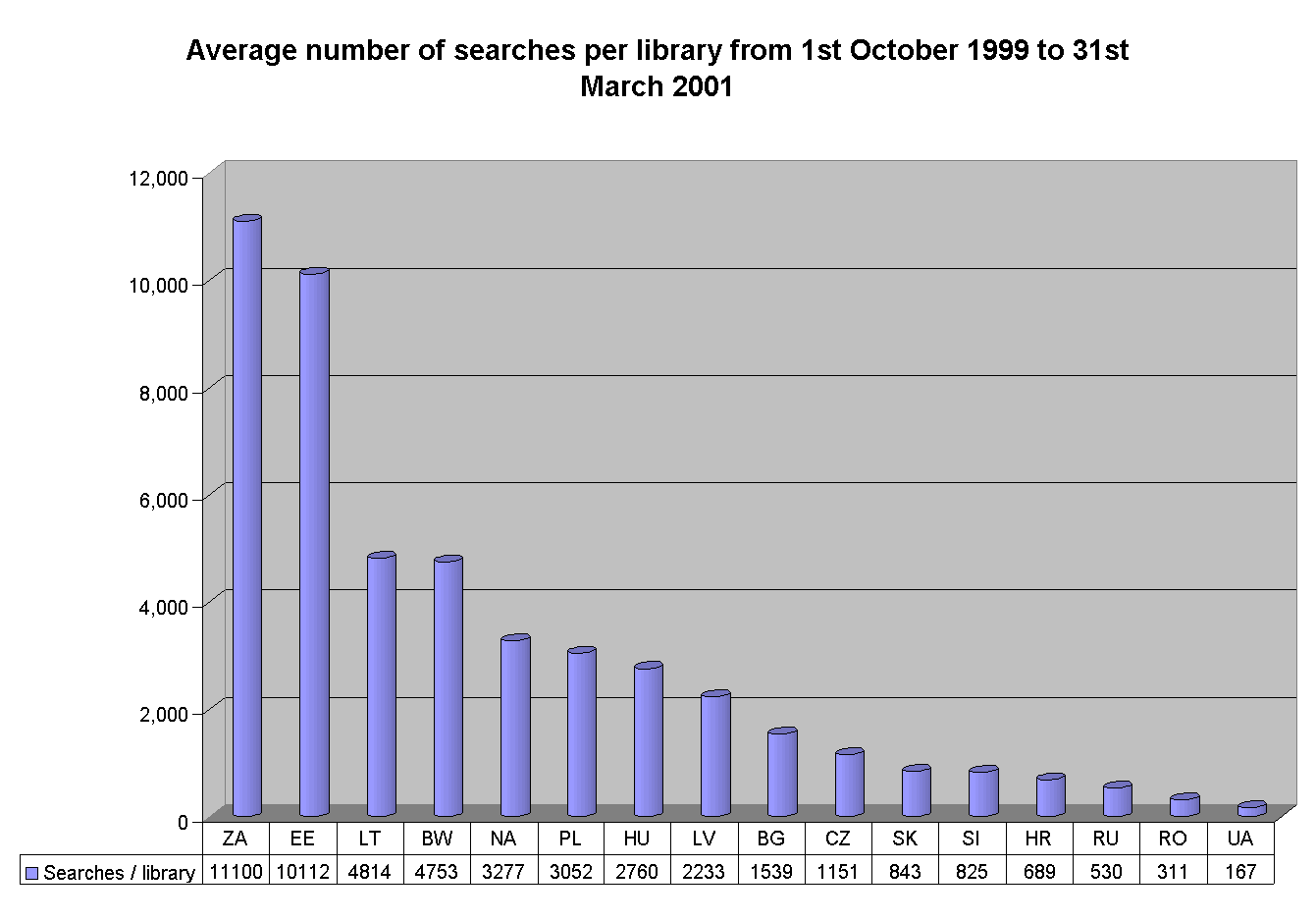
|
Project EIFL DirectHana Nová, National Library of the Czech Republic; Anna Maria Balogh, EIFL Direct, Open Society Institute, Budapest Open Society Institute and consortium building around EIFL Direct. Impact in other countries and their opportunities to involve in the project. Databases of EBSCO - acces and using. EIFL Direct in the libraries in the Czech Republic. BACKGROUND The Open Society Institute (OSI) Network Library Program has supported the libraries in the countries of the Soros foundations network since 1995. The projects and grants were focusing on infrastructure building, library automation and training of librarians. By 1999, it was felt that the time had come to take the first step in the provision of high quality electronic content.
METHODOLOGY Due to the high subscription prices of top scientific publishers, academic and public libraries in the countries of the Soros Foundations network used to have little or no access to priced electronic information. In the US and Western Europe, consortial deals for the purchase of electronic products had been in practice for quite a few years. A similar model was needed in order to negotiate lower prices on behalf of the library community of the region. This is how the idea of eIFL Direct (Electronic Information for Libraries – Direct) was conceived. eIFL Direct is a collaborative project between the OSI and EBSCO Publishing. How was EBSCO chosen? In April 1999, OSI put out an open invitation to tender to all companies dealing with electronic journals. Proposals had to focus on social sciences and humanities as these were considered as a priority area for the activities of OSI. Also, preliminary surveys to libraries in the region showed that there was a special demand for international scholarly resources in these areas. Seven companies submitted proposals. Three out of these were short-listed for further consideration. Two independent committees evaluated the products on the basis of 25 criteria, some of which were particularly relevant to the needs of libraries in the region, e.g.:
- number of FT journals, as most of the libraries cannot afford to subscribe to international journals in print format, so indexed articles are not sufficient
The unanimous decision was that EBSCO Publishing provided the most comprehensive services available on the market at that time.
The offer eIFL Direct provides access to over 3,500 journals in social sciences and humanities as well as in business and other academic disciplines. The medical database Medline is also included. Since the launch of the project, EBSCO has been working on adding more science and technology titles to their databases. The access to all these journals is ensured in a licensed searchable database package both in online and CD/DVD formats. Online users reach the databases through an ID and password protected Intranet site. Offline users are sent the CD/DVD-ROM-s by mail with bi-annual updates. The project started on 15 September 1999. There was a free trial period until December 31, 1999. The implementation was scheduled for three years, 2000, 2001 and 2002. Prices are guaranteed for this three-year period. The implementation started in 27 countries from Central and Eastern Europe, the former Soviet Union and Mongolia, 10 Southern African countries, Guatemala and Haiti. Types of eligible institutions include university libraries, research centres, national libraries, public libraries, parliamentary and ministry libraries as well as NGO-s. Training Training sessions are ongoing. From October 1999, EBSCO held a first round of training sessions in participating countries. These sessions were mainly organised in the capitals and were considered as the main introductory event for the project. In April 2000, the second round of training started, with a greater focus on cities outside the capital, new users and even individual institutions. There has not been training yet in Albania, Georgia and the Central Asian countries with the exception of Uzbekistan. Due to the lack of infrastructure and the small number of English speaking users, the usage is low in these countries.
MARKETING TO USERS The promotion of the project was initially undertaken by the national OSI coordinators that already had many contacts with the local library community. Librarians and users were referred to the FAQ section of the eIFL website. However, the promotion to library users seemed to be a problem. From visits to a number of very large libraries in the region, OSI staff have noted a distinct lack of promotional activity. In most cases, the promotion of the databases was done by personal recommendation. It was felt that printed marketing material would be needed. This is why the eIFL brochures were designed, produced and distributed by OSI. In autumn 2000, the eIFL posters were printed. Their aim is to promote the academic publishers the journals of which are accessible through the EBSCO databases and to raise the visibility of the project in participating libraries.
USAGE STATISTICS An administrative function is built in the online product, so usage can be monitored easily. Data can be retrieved by various categories: number of searches, databases searched, journals searched etc. EBSCO send monthly country-by-country usage statistics to OSI. From the 1st October 1999 to 31st March 2001: - more than 2000 libraries have registered
With respect to the number of searches performed, the leading countries are South Africa, the Czech Republic, Poland, Russia, Hungary and Estonia. As it can be noted from the library breakdown of the country usage sheets, the top user institutions are universities, business schools and medical schools. The following tables show some figures related to project penetration and usage from 1st October 1999 to 31st March 2001. Please note that these figures reflect the online usage only. We are aware that in many countries where connectivity is inadequate, the preferred method of access is via CD or DVD-ROM.
Table 1 shows the number of institutions that have registered for eIFL as of 31st March 2001. It is not surprising to note that Russia, with its vast library system, has the highest number of libraries in the consortium. This figure is expected to continue to grow. In the majority of other countries it is anticipated that the number will stay relatively static. Table 1.
Table 2 shows the number of online searches performed between 1st October 1999 and 31st March 2001. South Africa is well ahead of all other countries. There are at least two reasons for this. First, English is the spoken language, so this does not present the same barrier as in some other countries in the consortium. Second, many of the libraries already had access to EBSCO prior to the birth of eIFL. Therefore familiarity with the system and its contents has lead to a high number of searches.
Table 2.
The following chart shows some of the leading countries ranked by average use per library since the beginning of the project. Although it can be argued that these figures do not present an entirely scientific analysis, they show some interesting trends. When the number of searches performed is divided by the number of participating libraries per country, we get an overview of how intensively the system is being searched per country. Once again, South Africa comes out on top.
PRELIMINARY EVALUATION OF THE PROJECT The feedback from libraries has been essential for the evaluation and the further directions of the implementation. In September 2000, a first round of questionnaires was sent out to 250 libraries. 145 of them answered. The ratio of the high users to low users was roughly 2 to 1. The reasons for low usage was in priority order: English language being a problem, not enough awareness amongst library users and lack of computers. It appeared that online usage was four times higher than offline usage. The main reasons for online usage included the timeliness of the information as well as the convenience of searching multiple databases simultaneously. The main reasons for searching offline included poor connectivity and expensive telecommunications.
PAYMENTS FOR SUBSCRIPTIONS In the first year of implementation, OSI advanced the full subscription costs for the project to EBSCO. Consequently, countries had nearly a year to elaborate a funding strategy and negotiate with sponsors. This was necessary because the initiative was very new and both users and sponsors needed time to get familiar with the project and see its benefits. The national OSI coordinators played an important role in promoting the project, setting up meetings with library and government representatives. In 2000, funding strategies varied from country to country (full subscription paid by government, full subscription paid by libraries, subscription paid partly by ministries partly by libraries). The shortfall was subsidized by OSI. From 2001, OSI will no longer subsidize subscriptions. EBSCO is now collecting subscriptions directly. EBSCO’s representatives are in direct contact with the coordinators of the project in each country and when necessary, they are negotiating with the sponsors as well, in order to agree on deadlines for the payments. OSI has also been working on getting private sponsorship for the project from banks and financial institutions that may be interested in the emerging markets in the consortium. EBSCO has agreed to put banner advertisements of sponsors on the search interface.
FURTHER PLANS OSI has established a Content Task Force to help guide the addition of more content to the eIFL project. Members of the Task Force represent a number of the leading countries in the eIFL project. A comprehensive survey was designed and sent to all countries in the eIFL consortium seeking the views of libraries on what electronic resources they would wish to access at affordable prices in the areas of Science, Technology and Medicine. The results of this survey will be analysed in May and will form the basis for a new round of negotiations along the lines of those held for eIFL with the world’s leading STM publishers. It is OSI’s intention to create a menu of options that countries or individual libraries can choose from. The STM initiative is expected to be launched in late 2001 or early 2002.
BUILDING CONSORTIA In order to assure the sustainability of the eIFL Direct Project, OSI is giving increased importance to the creation of library consortia in participating countries. Consortia provide shared expertise, access to new electronic and print resources, professional development and even new sources of funds. They can also strengthen communication, negotiation, licensing terms and simplify administration. All these are key issues for the library and user community in the OSI countries. OSI aims to play an important role in facilitating exchange of experience and knowledge amongst national eIFL consortia.
ACKNOWLEDGEMENT The author would like to thank Michael Kay, Director of the Electronic Publishing Development Program, Monika Segbert, Consultant to the eIFL Direct Project and Rima Kupryte, Network Library Program Manager for their input to this paper. |
|
||||||||||







